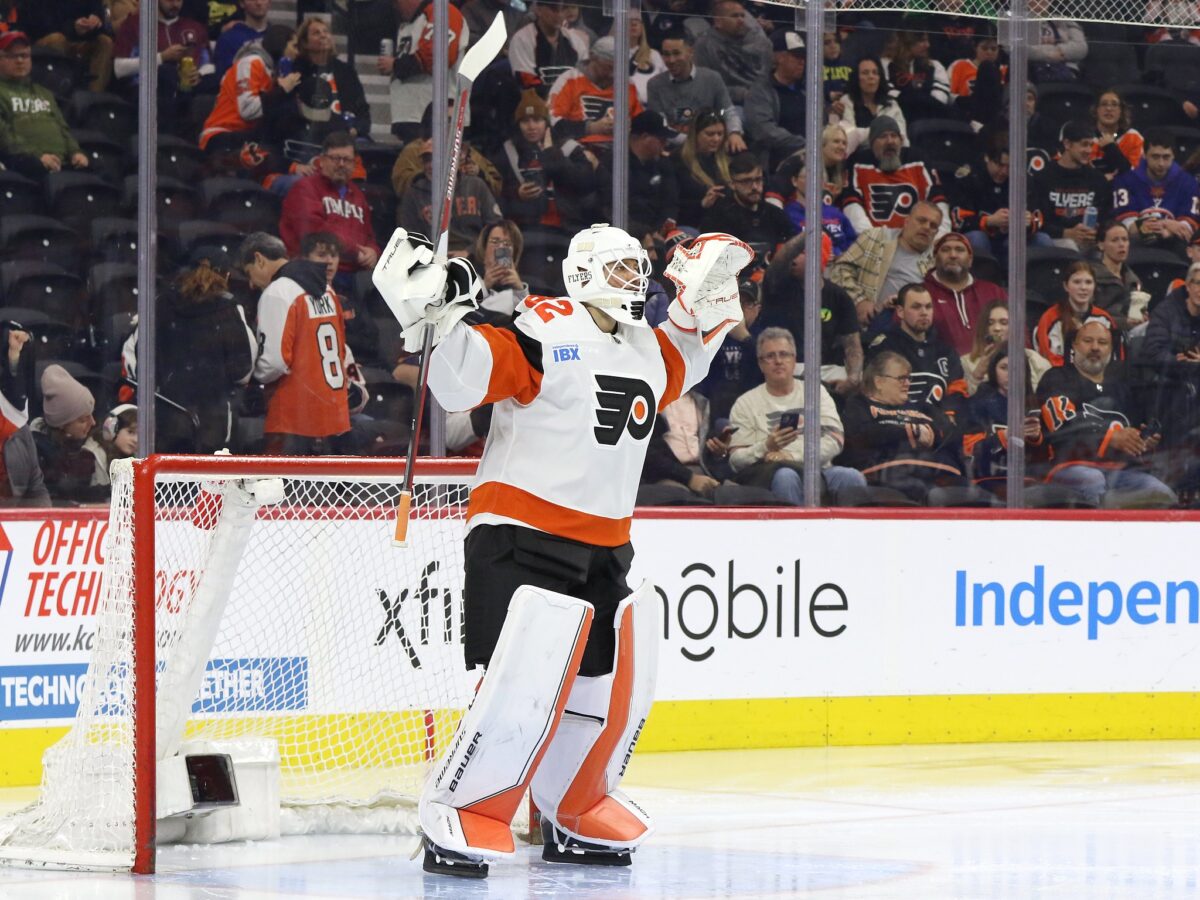On April 23, the Philadelphia Flyers signed goaltender Ivan Fedotov to a rich $6.5-million contract through the 2025-26 season, giving him an average annual value (AAV) of $3.25 million, as per TSN’s Darren Dreger. With a number like that, there’s no doubt Fedotov will be the backup for the Orange and Black.
However, Fedotov didn’t really earn his contract when looking at his NHL stats or even back in the Kontinental Hockey League (KHL). The 27-year-old has to show he’s capable of handling a high-end backup role, much less capable of being in the NHL at all. He has to take a massive step in the right direction in 2024-25 to prove he is worth the hype.
Fedotov’s Struggles in 2023-24
Fedotov was in an unfortunate situation in 2022-23, as he was forced to miss the entire campaign due to mandatory military service. Judging him for some of his struggles in 2023-24 in both the KHL and NHL aren’t exactly fair, but they are definitely worth noting considering his high salary.
Fedotov made the trip to North America late in the season and made his NHL debut on April 1, so he didn’t have a lot of time to get a feel for what the NHL is like. Still, he wasn’t very good.
Among all KHL goaltenders in 2023-24, Fedotov was in the 45th percentile in save percentage (SV%) at .914 in 44 contests. Once he came over to the NHL, things only got worse. His .811 SV% in three games ranked 97th out of 98 total netminders. He had a decent outing against the New York Islanders in relief of starter Samuel Ersson but struggled mightily against the Buffalo Sabres and Montreal Canadiens, ending with a 0-1-1 record, 4.95 goals against average (GAA,) and negative 5.4 goals saved above expected (GSAx.)

To put Fedotov’s struggles in perspective, Cal Petersen, who might end up being the Flyers’ American Hockey League (AHL) backup in 2024-25 due to the arrival of Alexei Kolosov, had better overall numbers. He ranked in the 46th percentile for SV% in the AHL at .902 in 28 games and was 92nd out of 98 goaltenders in the NHL for SV% at .864 in five contests.
Fedotov and Petersen had similar issues in the NHL, as their positioning at times wasn’t great and neither of them came up with big saves when they were needed. Looking at the numbers and based on the eye test this season, there is really nothing to suggest that Fedotov is any better than the team’s potential fourth-string netminder for 2024-25. That’s a red flag.
Ersson Needs Help
Looking at how badly Ersson’s play regressed when he began starting every single game down the stretch, the Flyers’ need for a high-end backup is clear. Through the team’s first 41 games, he had a .904 SV%, a 2.46 average (GAA), and 2.3 GSAx. In their last 41 games, he had a .883 SV%, a 3.04 GAA, and minus-9.0 GSAx.
The issue for Ersson is that he appeared in 33 of the Flyers’ games in the second half of the season. That comes out to a full-season pace of 66 contests, which is a pretty absurd mark for a 24-year-old rookie. By the end of the season, he just couldn’t make saves consistently.
The idea of getting Ersson a solid backup isn’t a crazy one. Bringing someone on board who can start around 30 games in 2024-25 makes sense just to take some of the pressure off Ersson and let him rest a little bit down the stretch. Seeing as the Flyers had nobody to do that with poor backup play, he had to suck it up and play anyway — one of the major reasons the Flyers missed the playoffs.
Related: 3 Reasons for the Flyers’ End-Of-Season Collapse in 2023-24
Looking at the numbers and Fedotov’s actual play, starting 30 games would likely be a stretch. He has some good athleticism and his 6-foot-7, 214-pound stature makes him a solid commodity, but he just hasn’t shown much yet. He has a lot of learning to do, so betting on his abilities by giving him a $3.25 million AAV is definitely a major risk. Having as much cap space as possible is always a good thing, so spending a chunk of it so quickly was an interesting choice from general manager Danny Briere.
Fedotov has talent, it’s just about putting it all together. After missing his entire 2022-23 campaign, it was most certainly an adjustment for him to go back to playing and then starting games in hockey’s most challenging league. All of the excuses have to go out the window with his new contract, though — he has to perform.
